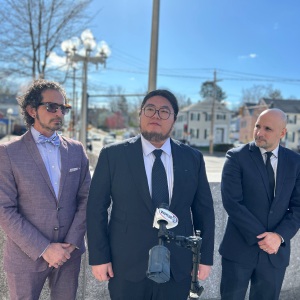Vermont Agency of Education walks back request that school districts report compliance with President Trump’s anti-DEI directive
|
Published: 04-08-2025 4:30 PM
Modified: 04-08-2025 5:23 PM |
Following a federal directive that schools ban “illegal” diversity, equity and inclusion-related programs, the Vermont Agency of Education last Friday asked school districts to submit compliance certifications.
But just three days later, after initially defending and clarifying the decision in the face of public backlash, Education Secretary Zoie Saunders backtracked late Monday afternoon, informing superintendents the state would instead send a single statewide certification.
“To be clear, the Agency of Education and the Attorney General’s Office continue to support diversity, equity, and inclusion practices in our schools. Our communication on Friday was intended to make you aware of the directive from the U.S. Department of Education regarding Title VI,” Saunders wrote Monday afternoon, “and to reinforce that diversity, equity, and inclusion practices are lawful and supported in Vermont. In no way, did AOE direct schools to ban DEI.”
So why all the confusion?
On Friday, Saunders told school district leaders they had 10 days to submit their certification, but also said the agency believed certification required only that districts “reaffirm … compliance with existing law.”
That communication came in response to President Donald Trump and his administration, who have threatened to withhold funding to public schools that fail to comply with the expansive directive.
A letter dated April 3 from the U.S. Department of Education said noncompliance with the diversity programming ban could result in schools losing a crucial stream of money meant to support economically disadvantaged students, known as Title I, among other sources of federal dollars. The letter cited Title VI of the Civil Rights Act of 1964, which prohibits discrimination in schools based on “race, color or national origin,” and also cited a 2023 U.S. Supreme Court Case against Harvard University and the University of North Carolina that restricted affirmative action.
Saunders, in the letter to district leaders, wrote that the federal restriction includes “policies or programs under any name that treat students differently based on race, engage in racial stereotyping, or create hostile environments for students of particular races.”
Article continues after...
Yesterday's Most Read Articles
 Hundreds of alumni sign letter urging Beilock, Dartmouth to make a stand for academic freedom
Hundreds of alumni sign letter urging Beilock, Dartmouth to make a stand for academic freedom
 Kenyon: A year later, effects of mass arrests at Dartmouth linger
Kenyon: A year later, effects of mass arrests at Dartmouth linger
 ‘A bit Kafkaesque’: Federal judge spars with government lawyer over status of Dartmouth international student
‘A bit Kafkaesque’: Federal judge spars with government lawyer over status of Dartmouth international student
 Woodstock demotes police chief to patrol officer
Woodstock demotes police chief to patrol officer
 High school baseball: Windsor rebuilds while Thetford shines
High school baseball: Windsor rebuilds while Thetford shines
 Outgoing Alice Peck Day CEO led hospital through growth and change
Outgoing Alice Peck Day CEO led hospital through growth and change
Programs highlighting specific cultures or heritages “would not in and of themselves” violate federal regulations, the letter said. “We do not view this Certification to be announcing any new interpretation of Title VI,” Saunders wrote, adding that the agency’s “initial legal review” determined the federal letter only required the state to “reaffirm our compliance with existing law.”
But guidance from the federal education department cited by Saunders seems to restrict a variety of practices, arguing that school districts have “veil(ed) discriminatory policies” under initiatives like diversity programming, “social-emotional learning” and “culturally responsive” teaching.
Following news of the agency’s letter to districts, Saunders released an initial public statement around 3 p.m. on Monday saying the federal demands would not require Vermont’s schools to change practices. And in that communication, Vermont’s top education official gave no indication the agency would alter its request for districts to confirm their compliance with Trump’s directive.
“The political rhetoric around this federal directive is designed to create outrage in our communities, confusion in our schools, and self-censorship in our policy making. But we are not going to allow the chaos to control how we feel, or how we respond,” Saunders said in the statement. “Our priority is to protect Vermont’s values, preserve essential federal funding, and support schools in creating positive school environments free from the type of bullying and manipulation we see in our national politics today.”
In the same press release, Vermont Attorney General Charity Clark said Vermont was in compliance with federal law.
“We will continue to protect Vermonters against any unlawful actions by the federal government,” Clark said.
One neighboring state, meanwhile, took a different tack. Soon after the Trump administration sent states last week’s letter, New York announced it would not comply.






 Lebanon to close street, block parking to allow outdoor dining
Lebanon to close street, block parking to allow outdoor dining More research time or information overload? Lawmakers weigh moving state primary elections 3 months earlier
More research time or information overload? Lawmakers weigh moving state primary elections 3 months earlier
